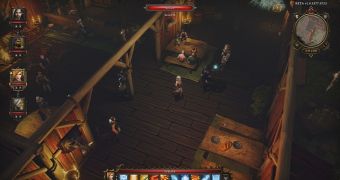Belgian developer Larian Studios has just shipped its biggest project to date, a role-playing game of a classic flavor, titled Divinity: Original Sin.
Perhaps the most impressive thing about the massive undertaking is that the company used the help of everyday gamers in order to fund its efforts, instead of going the traditional route of teaming up with a publisher.
In the end, its game turned out to be a great modern incarnation that stays true to its oldschool origins and sits at the top of Steam's best-selling list since its launch on June 30.
One of the role-playing game's peculiarity is the inclusion of the option for players to tackle its challenges together, in cooperative multiplayer.
"We always wanted to make an old-school PC RPG with multiplayer. We never managed to sell it to a publisher in the past; every time we proposed, it was refused," the founder of Larian Studios, Swen Vincke, tells GamaSutra.
The studio even managed to have the game ready to ship before two similar high-profile projects, Richar Garriott's Shroud of the Avatar and inXile's Torment: Tides of Numenera, and Larian attributes its success mainly to its devoted Kickstarter community and the great work everyone did testing the game during its six months on Early Access.
"We never expected it to be this successful. It's all due to Kickstarter and Early Access," says Vincke, noting how whenever they attempted to fit multiplayer options into its previous projects, including Divinity: Original Sin's precursor, Divinity II, the QA costs entailed by such an undertaking always caused publishers to ask for the feature's removal.
This time around, most of the QA work was done voluntarily, by Kickstarter backers and Early Access players that were invested in the company making a high-quality game, because they were making it with the players' money. The game's public development process was what made it possible for the game to ship so fast with working multiplayer.
"We had like 20,000 people who were willing to play this game and would probably give us the feedback we needed to test all the various gameplay permutations," Vincke explains.
Over time, more and more people from various Kickstarter backer tiers were allowed to try out the game, and its launch on Steam Early Access meant that even more players came into the equation.
"It was a huge QA operation - almost 70k testers - but we didn't have to spend as much money as we would have had to do otherwise, say if we had a traditional business arrangement with a publisher," Vincke says.

 14 DAY TRIAL //
14 DAY TRIAL //